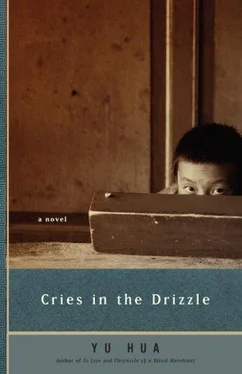It was when he went into the two rooms that had been emptied of belongings that Guoqing first began to feel sad. Even then he did not think his father had abandoned him forever; the sight of the deserted rooms alone was enough to prompt his tears. The pristine environment of his own room — which I had visited so often, whose window I so adored — helped Guoqing calm down, and he sat down on his bed to think things over. Only when he found me later that afternoon did he fully realize his predicament. I was busy cleaning Li Xiuying's favorite window when I heard him calling me from outside. I dared not leave the window before I had finished the job, but Li Xiuying could not stand Guoqing's shouts, which pierced the air like the sound of breaking glass. Sitting in bed, she said to me in dismay, “Oh, do tell him to shut up.”
How could I tell him to be quiet when he was in such a fix? We stood in the stone-paved street while the power lines above us maintained a steady hum. I still remember how pale Guoqing looked as he told me what had occurred — all in confused fragments, for he was still not really clear about it in his own mind. He presented his story as a series of random impressions, like flies that buzz around and abruptly change direction — from the enormous strength his father displayed when moving furniture to the look on his father's face when he went out the door holding the baskets. I had trouble sorting out which things happened first and which later. As he told me the story, Guoqing suddenly realized what it all meant, and his narrative petered out. Tears gushed from his eyes, and he said something that he and I both understood perfectly: “My dad doesn't want me anymore!”
We went to find Liu Xiaoqing and found him running toward the river, a mop over his shoulder. He was shocked by the sight of Guoqing's tears. I told him Guoqing had been abandoned. At first Liu Xiaoqing was as baffled as I had been earlier, but my wordy explanation, accompanied by frequent nods from Guoqing, eventually got the facts through to him. Right away he said, “Lets find my big brother!”
To consult the older boy in his peaked cap seemed an excellent idea, and for Liu Xiaoqing to suggest this so proudly struck me as quite natural. Who wouldn't want a brother like that? We went over to the window where he was sitting, and now it was Liu Xiaoqings turn to tell the story. Toying with his flute his brother heard him out. He seemed very indignant. “This is outrageous!” he said.
He stuck the flute in his pocket, jumped out the window, and beckoned us. “Come on, let's go and sort him out!”
We three children walked along the damp street. A rain shower early that morning had drenched the trees. Leading the way was Liu Xiaoqings brother — an older boy, to be sure, but rather skinny. He could play a fine tune on the flute, but could he get the better of Guoqing's father? The three of us followed him quietly, buoyed by his outrage. Reaching a tree heavy with rain, he seemed lost in thought, but when we caught up with him he raised his foot and kicked the trunk with all his might, at the same time darting off. Droplets showered down on us, soaking us to the skin. He ran off home, chortling.
His action, obviously, was most inglorious, for otherwise Liu Xiaoqing would not have turned red. Mortified, he said to Guoqing, “Let's go talk to our teacher about it.”
Now sopping wet, Guoqing shook his head and said with a sob, “I don't want to talk to anyone about it!”
And he stalked off. This clever little boy could rattle off the names of all his maternal uncles and aunts, and when he got home he thought of them and sat down to write them letters — in pencil, on paper torn from his exercise book. At this point, when he was still struggling to find words to describe his plight to us, he must have found it even harder to write about it. When every one of his mother's siblings rushed to his side soon afterward, this showed how well he had put things.
Precise as he was, Guoqing recalled the workplaces of all his uncles and aunts and wrote their addresses on eight envelopes. But he wasn't sure just how to mail the letters. With his customary concern for order, he folded the eight sheets of paper into eight little squares. He clutched them to his chest and made his way to the forest green post office.
He found a young woman behind the counter. Guoqing timidly went up to her, asking in a pathetic tone, “Auntie, can you tell me how to post letters?”
Rather than answering, she asked him instead, “Do you have money?”
To her surprise Guoqing brought out a ten-yuan note. She did help him then, but she looked at him warily, the way one eyes a pickpocket.
Once the eight brothers and sisters of Guoqing's mother had assembled, they made an impressive party. Together they marched off toward his father's new house, Guoqing in the middle, the grown-ups surrounding him with determined looks on their faces. Guoqing had worn an expression of sheer misery the past several days, but now, pampered by his aunts and uncles, he walked among them with his confidence fully restored. At regular intervals he would turn back toward Liu Xiaoqing and me and call: “Be sure to keep up with us!”
It was late in the afternoon by then. Walking with this group of adults, I felt very important, almost as important as Guoqing; Liu Xiaoqing was also looking cocky. Guoqing declared jubilantly that his father would soon be moving back home.
It was my first outing after dark since I had come to Little-marsh. When I asked Wang Liqiang's permission to leave the house I told him what had happened, and I was grateful to him for allowing me to go out so late in the day. While sympathizing with my desire to stand with Guoqing in his hour of need, he cautioned me not to open my mouth. In fact, however, Liu Xiaoqing and I would never have been allowed to enter Guoqing's father's new home; we had to wait outside. A squat little building stood before us, and we found it strange that Guoqing's father would leave the two-story house for such a modest dwelling.
“There's no view here at all!” Liu Xiaoqing and I agreed. We could hear the voices of the eight visitors from out of town. Their city accents evoked tall buildings and asphalt roads. At this moment two boys much younger than us came swaggering over and told us presumptuously to clear off. Only later did we realize that they were the darling sons of Guoqing's father's new wife. The idea that we could be driven away by two smaller boys was ridiculous, of course. We warned them that they'd better push off themselves. They spat at us then, and Liu Xiaoqing and I gave them each a punch in the face. These two little fellows were all bark and no bite, for they immediately burst out crying. But reinforcements arrived promptly, charging out of the house in the form of a woman as fat as a tub of lard. Guoqing's father's bride bore down on us with spit spraying from her mouth and such a murderous gleam in her eye that we fled in terror. She followed close behind, cursing us fiercely in language we thought only men were accustomed to using. One minute she threatened to toss us into the cesspit; the next minute she vowed to hang us from a tree, describing to us as we ran a whole series of awful fates. As I tired, I turned my head to look back; my scalp went numb when I saw the way her flesh wobbled as she ran. All she needed to do was sit on us and she would crush the life out of us.
Only after we ran across a stone arched bridge did we see her stop and turn around, still hurling curses. She probably felt that it was more vital that she go to the aid of her husband. After establishing that she was not waiting in ambush at some point along the road, Liu Xiaoqing and I fearfully edged our way back, vigilant as scouts in a movie who venture deep into enemy territory. By then the sky was dark, and when we returned to our original spot under the lamplight we still heard only the impassioned voices of the eight uncles and aunts. We wondered why Guoqing's father was saying nothing. After a long time we finally heard a different voice, the voice that had pursued us. His wife was saying to them, “Did you come here for a fight or for a discussion? For a fight you need a lot of people, but for a discussion one is enough. I want all of you out right now. One of you can come back tomorrow.”
Читать дальше












